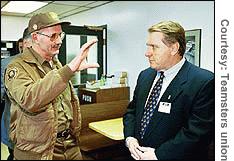|
Teamsters, UPS in talks
|
 |
January 30, 2002: 10:33 a.m. ET
Early start to negotiation to replace deal reached after 1997 strike.
By Staff Writer Chris Isidore
|
NEW YORK (CNN/Money) - Negotiators for United Parcel Service Inc. and the International Brotherhood of Teamsters are set to meet Wednesday for early talks on a new contract to replace the one reached after a devastating 15-day strike in 1997.
The contract is not set to expire until 12:01 a.m. Aug. 1. The company insists the early talks are a good sign that a strike can be avoided this time around. Avoiding even the risk of a strike is important in the world of trucking, where customers can shift freight to competitors if they fear there could be disruptions of service.
"We know our employees and customers want to see a new agreement negotiated as soon as practical," said a statement from Chris Mahoney, senior vice president at UPS. "The Teamsters have said they recognize an early start to negotiations is the best way to protect UPS volume and preserve Teamsters' jobs."
The contract could be an important boost to organized labor at a time of a slowing economy and rising unemployment. With 230,000 Teamsters working full-time or part-time at the Atlanta-based company, the contract represents one of the largest labor pacts in the nation.
Despite declining domestic shipments and profits due to the slowing economy, UPS (UPS: down $0.13 to $56.27, Research, Estimates) presents the union one of the deepest set of pockets with which to negotiate. The company topped Wall Street's most optimistic forecasts and its own earnings guidance when it released fourth quarter results Tuesday, although it warned that continued slowness in the U.S. economy would cause it to miss first quarter forecasts.
And the 1997 strike represented one of the greater public relations victories for a U.S. union in recent years, as polls showed the general public stood by their friendly UPS delivery driver rather than management, even if it meant disruptions in their packages.
The union also says it wants to avoid a strike, but has engaged in some level of saber-rattling, saying it won't be afraid to shut down the world's largest transportation company over some issues.
"What it comes down to is the company is pushing an early negotiating line to maintain its customer base," said union spokesman Bret Caldwell. "Our only concern is that our members get a good contract. The fact is nobody wants a strike, but there are strikeable issues out there."
Company could lose market share
Bear Stearns analyst Ed Wolfe said it would be a mistake for investors to assume that early talks are sign that it will be smooth sailing for UPS.
"(We) anticipate some downside risk during what is likely to be a long negotiating process with the Teamsters," he said. "Our sense is that UPS is also susceptible in the near term to incremental market share losses to FedEx (FDX: up $0.26 to $52.74, Research, Estimates) and Airborne Express parent Airborne Freight (ABF: down $0.08 to $14.84, Research, Estimates) until the Teamsters negotiation is resolved."
Wolfe points out that FedEx ground shipments grew 11 percent in the quarter ending Nov. 30, suggesting some incremental shift in market share. But he said that UPS's dominance in that market means that it hasn't hurt its top or bottom line significantly yet.
The company already pays its drivers more than any competitors. Drivers get about $23.11 an hour, not including benefits, compared to about $15.72 for the non-union drivers at FedEx $19.19 for comparable employees at the U.S. Postal Service. Teamster drivers for old-line trucking companies earn about $20 an hour in an multi-employer pact.
| |

|
|
Teamsters President James Hoffa, right, meets with a union member at UPS's Louisville hub recently. | |
There were many issues involved in the 1997, the company's only national work stoppage in the 80 years it has been unionized. But the key point that sparked the strike was a company effort to pull out of Teamster-run pension plans.
The company argued at the time that the multi-employer plans were leaving it paying Teamster retirees who worked for competitors that had gone out of business. It was willing to pay more than $1 billion to get out of the funds. The union said no, and eventually won on the issue.
It seems unlikely that the company would push that issue in talks again given the damage done by the strike and the union's victory on the issue.
"We hope they (UPS management) learned their lesson in 1997 that these are issues members care very much about," said Caldwell.
But while UPS spokesman Norman Black, said "We're not going to make any prediction whether that will be an issue again at the bargaining table," he did add, "The broader (pension fund) problem there has not gone away."
The union also will again try to get full-time status for more of its part-time employee members at UPS. Only about 42 percent of Teamsters at the company have full-time status, although part-timers earn an average of $10.72 an hour, plus full benefit, according to the company. That percentage of full-time employees is up from the 39 percent who were full-time in 1997, but less than the union's goals in the last negotiations. The union has used arbitration to win slightly more full-time positions under the current deal.
Click here for a look at transportation stocks
Since the 1997 strike UPS has gone public. Employees, retirees and heirs of the founders still own most of the shares, but share prices which management did not have to worry about in 1997 could plunge if there were a strike this time.
The union is in somewhat weaker financial situation, with no strike fund to speak of this time around. But Caldwell said the union will be seeking a line of credit soon to give it the resources to cover an estimated $20 million a week in strike benefits should there be a work stoppage. 
Click here to send mail to Chris Isidore
|
|
|
|
|
|

|

